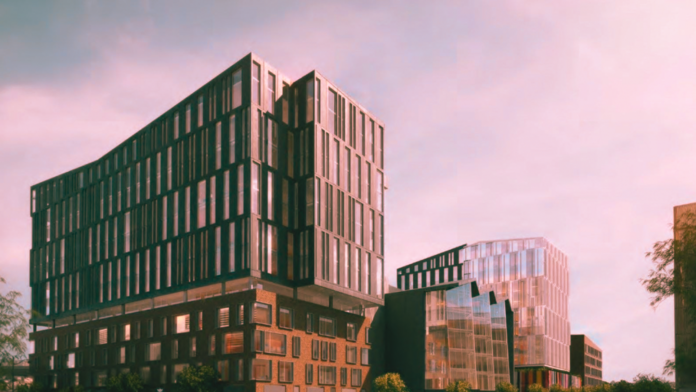In the heart of Silicon Valley, a transformation is underway. Rewind ten years, and Pear VC was a fledgling venture firm, adding flair to its Palo Alto office with vibrant, tech-inspired decor. Fast forward to now, and they’ve made a significant leap. Pear VC just sealed a deal for 30,000 square feet of prime “Class A” real estate in San Francisco’s Mission Bay, subletting from the file-storage behemoth, Dropbox.
San Francisco’s office landscape is morphing. While some well-established firms downsize their physical presence, newer, ambitious companies are seizing the opportunity to expand into these coveted spaces.
Case in point: OpenAI, creator of ChatGPT, recently sublet an impressive 486,600 square feet of office space from Uber. Uber, reevaluating its needs, decided to scale back, thus making way for OpenAI to occupy two of its original four-building lease. In another striking move, Anthropic is now taking over a 250,000-square-foot building – once the headquarters of Slack.
Tracing back the connections, Salesforce, the 2021 acquirer of Slack, has invested in Anthropic. In a nostalgic twist, Pear VC co-founder Pejman Nozad, once a newcomer to the U.S. from Iran, made one of the initial investments in Dropbox, a business relationship that began long before he transitioned from selling Persian rugs to Silicon Valley elites.
But it would be a mistake to think these subleasing deals are purely built on old bonds and friendships. Nozad quickly dispels that notion. For them, the new space, with potential for over 200 desks and an event space for talks, was strictly business. Nozad playfully mentions, “I sold rugs for 17 years, so I have some skills in negotiation.”
For up-and-coming well-funded firms, it’s an opportune moment. Colin Yasukochi, an executive director at commercial real estate firm CBRE, highlights the attractive rates in prime areas like Mission Bay and the city’s Financial District. These rates, ranging between $60 to $80 per square foot, become even more enticing for companies when compared to pre-pandemic prices.
In a city known for its tech prowess and dynamic business scene, about 35% of San Francisco’s commercial spaces remain vacant. Yet, there’s a silver lining. Established companies are reevaluating their needs, and emerging stars are ready to fill the void. Dropbox, for instance, never completely utilized its colossal 750,000-square-foot space, even before the pandemic. Today, while it continues to downsize, others like Vir Biotechnology and BridgeBio are filling the gaps.
Recently, Adobe has also joined the subleasing trend, listing sizable parts of its leased space in San Francisco’s Showplace Square. Yet, market analysts see the tide beginning to turn. Recent data indicates a growing demand for San Francisco office spaces, arguably driven by companies like OpenAI.
Yasukochi believes the allure lies in the opportunity to inhabit high-end spaces in central city areas, often at competitive rates. And for companies eager to rejuvenate in-person collaborations – like OpenAI’s CEO, Sam Altman – the chance is golden.
With 2023 on the horizon, Yasukochi anticipates a potential boom for tech companies. If economic indicators remain positive and interest rates favor businesses, the tech sector, quick to adapt and scale, might spearhead San Francisco’s renaissance. However, he’s also observant of emerging hubs like Hayes Valley, where AI communities are thriving. Yet, he notes that most of its denizens prefer more casual, communal settings over structured offices.
In conclusion, San Francisco’s commercial landscape is in flux. With tech companies ready to reshape the city’s office spaces, one thing is clear: the next chapter of Silicon Valley’s evolution is unfolding, and it promises to be riveting.












